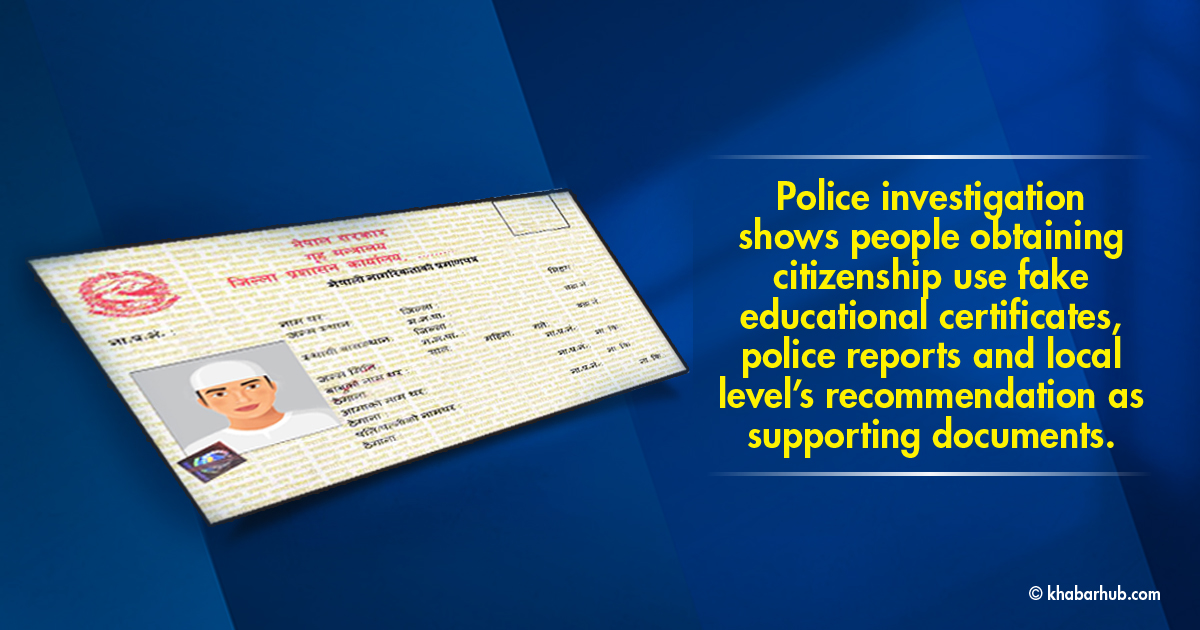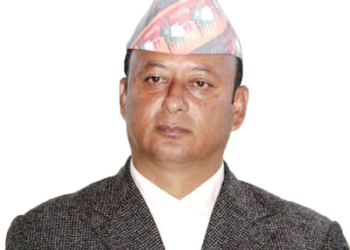KATHMANDU: The incidence of obtaining citizenship on the basis of fake documents is not new in Nepal.
Experts claim it’s going on for many decades. Police records have shown that the problem is more chronic in the terai region.
According to SSP Kuber Kadayat, the Spokesperson of the Nepal Police, the incidents of fake citizenship are more frequent in the bordering areas close to India. Most of the people approaching and taking fake citizenship are found to be Indians and Bangladeshi.
The police investigation shows that most of the people who obtain citizenship use fake documents of educational certificate, police report and local level’s recommendation as supporting documents.
They often obtain documents by influencing people’s representatives. Some even obtain fake citizenship with facilitation from the bureaucrats themselves.
Incidents of fake citizenship in the last two months
The police arrested a Ward Chairperson of Kailali on October 30 on allegation of facilitating an Indian to take the fake citizenship certificate.
Ganesh Prasad Joshi, the Ward Chairman of Ward 12 of Dhangadhi Sub-Metropolitan City was nabbed by police for providing citizenship to an Indian on the basis of descent by producing a ‘fake father’.
According to the police, Joshi presented Puni Ram Chaudhary, an inhabitant of Dhangadhi-12 Himmatpur as the father of an Indian national alias Ansari in March 2019 and recommended for citizenship.
“After finding that Ward Office has recommended Chaudhary as the father of Indian National Alias Ansari, we have nabbed the Chairman,” DSP Pratik Bista, the spokesperson of District Police Office Kailali told Khabarhub, “Now he is released on bail.”
Four more persons were also nabbed in the same allegation.
In the third week of November, two Indians were found to have taken Nepali citizenship from Kapilvastu, Nepal.
Balaji and his wife of Bujurgagram, Soharatgadh, were found taking citizenship from Maharajgunj-1, Kapilvastu Nepal.
Balaji has obtained citizenship in the name of Raju Yadav.
Both Balaji and his wife obtained their citizenship as Nepali nationals in August 2013.
Balaji had mentioned Gobre Ahir of Maharajgunj-1, Kapilvastu to obtain his citizenship on the basis of descent.
“Fake citizenship distribution in Nepal’s bordering parts with India has grown up as a chronic problem,” Criminologist Madhav Acharya told Khabarhub, “This is alarming from a security perspective.”
The real name of Balaji’s father in India is Bhikhi Yadav and he has his family’s name is in the voter list of India. His wife’s name is in the list of India and Nepal.
Dirgha Narayan Paudel, the Chief District Officer of Kapilvastu informed that the government has initiated action against those obtaining fake citizenship.
Sarlahi police nabbed Girja Bahadur Bhandari, 52, of Hariban-10 Taiwan Sukumbasi Tol in the third week of September for presenting an Indian as his son to obtain citizenship.
He had obtained a recommendation from the local level claiming the Indian national as his son on December 19, 2019. The Indian national was also arrested with fake citizenship.
According to SP Santosh Singh Rathore, the Chief of District Police Office Sarlahi, Bhandari had helped Sita Ram Singh Rajput, 25, of Sitamadhi, Baghmadhi obtain Nepali citizenship in the name of Niraj Bhandari.
These three instances of Kailali, Kapilvastu and Sarlahi are the representative cases related to fake citizenship certificates.
According to the police headquarters’ statistics, 12 cases of fake citizenship distribution have been registered at the police in the first three months of this fiscal year. Out of these cases, there are five cases in Province 2 alone.
The statistics show that in past three years and three months, the police received 251 cases of fake citizenship registered at various offices throughout the country.
Province 2 has seen the highest number of cases in this period as well. There are 90 cases of fake citizenship in Province 2 alone. Province 1 received 64 such cases in the same period.
Likewise, Lumbini Province has got 27 cases of fake citizenship, Kathmandu valley 15, Bagmati Province 20, Gandaki Province 19, Karnali Province nine and Sudur Paschim Province four cases in the period of past three years and three months.
Legal Provisions
The Directives for the Distribution of Citizenship, 2013 hails that as per Clause 21, sub-clause 9 (10) of Citizenship Act, a foreigner obtaining Nepal’s citizenship by wrong means or fake documents is entitled to 1-5 year in prison or Rs 50,000 to 100,000 as fine or the both as punishment.
Likewise, a person who verifies or recommends the foreigner as the national elections for citizenship has to face 6 months to 3 years imprisonment or Rs 25,000 to 50,000 as fine or both for the deed.
The security threat increased: Experts
Security experts claim that Indian, Bangladeshi and Pakistani Muslims strive to obtain citizenship to ensure their stay here safe. This has further aggravated the security threat in Nepal.
Criminologist Madhav Acharya also regards the foreigner’s easy access to Nepali citizenship as a security threat here.
“Citizenship distribution in the parts bordering with India has been a great challenge,” Acharya told Khabarhub, “It’s highly sensitive from a security perspective that the Non-Nepalis are obtaining citizenship in the parts bordering with Indian.”
Acharya concludes that many criminals enter Nepal to keep out of sight of the security agencies in their country, take shelter here and later initiate a procedure to obtain citizenship. Besides, they have a fat chance of obtaining many facilities meant for Nepali nationals.
“It is found that Indian, Bangladeshi and Pakistani nationals are striving to obtain citizenship producing fake documents especially in the terai region of Nepal,” Former DIG of Nepal Police Hemanta Malla told Khabarhub, “Foreigner’s easy access to our citizenship of Nepal add further challenges to the security system of the country like Nepal.”
He adds that the citizenship procuring process has to be regulated more strictly from local levels as well. He reiterates the need to make the whole process more systematic and transparent.









Comment